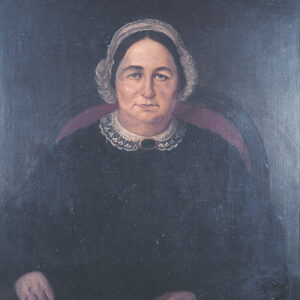calsfoundation@cals.org
Frances Isaiah Isaacs (Fanny) Block (1796–1871)
Frances (Fanny) Block was the matriarch of the first documented Jewish family to immigrate to what became the state of Arkansas. After courtship and the start of a family in Virginia and New York, Block and her family moved to southwestern Arkansas in search of new economic opportunities. Her willingness to forgo the stability of a religious community on the East Coast and move her family west allowed the family to establish a regional mercantile empire that included businesses in places such as Washington (Hempstead County), Fulton (Hempstead County), and Paraclifta (Sevier County) in Arkansas, as well as in New Orleans, Louisiana, and at several stops along the railroad in Texas from Houston to Dallas. Fanny Block and her family set the precedent for other Jewish migrant families to populate Arkansas. The family home in Washington has been restored and is actively interpreted as a house museum at Historic Washington State Park.
Frances Isaiah Isaacs was born on February 27, 1796, in Charlottesville, Virginia, to Hetty Hayes Isaacs, the descendent of a pioneering Sephardic family, and Isaiah Isaacs, a noted Jewish merchant and early Jewish pioneer in Virginia. Her parents both died early in her childhood—her mother in 1803 and her father in 1806. Her father’s 1803 will stated that she and her younger brother were to be placed in the care of a Jewish family, very likely members of the Hayes family in New York. Her father also stipulated that his businesses in Richmond, Virginia, were to be willed to her and her brother when her brother reached the age of twenty-one.
On October 2, 1811, at less than fifteen years old, Fanny Isaacs married the thirty-one-year-old Abraham Block (or Bloch) in New York. Her lineage and upbringing in a colonial Sephardic Jewish home and Block’s Ashkenazim origins made their union somewhat of a mixed marriage, though Block’s business prospects likely contributed to the approval of the marriage by her Sephardic relatives. She gave birth to fourteen children, with twelve surviving past infancy.
In 1823, after her brother’s twenty-first birthday, the Blocks began to liquidate inherited property and began the process of moving the family westward toward the Arkansas Territory. This move was probably brought about by limited economic opportunities in Richmond, as well as the influx of capital from Fanny Block’s half of the inheritance. By 1825, Abraham Block had started a business in the Arkansas town of Washington. His wife and the seven children they had at the time traveled to New Orleans to await the completion of the family home in 1827.
Although both Fanny and Abraham Block were raised in strongly Jewish homes and had strong ties to the Jewish community in New Orleans, they were unable to attract others in that community to join them in Washington. As a result, once they were in Arkansas, their only connections to the broader American Jewish community were periodicals and occasional visits to New Orleans. When the first congregation, Gates of Mercy, formed in New Orleans in 1827, the Blocks joined as founding members.
The limited contact with other Jews restricted the manner in which Fanny Block could run an observantly Jewish home. She was unable to provide the family with kosher meals; however, archaeological work at the home has suggested that the family was able to adhere to other Sephardic Jewish practices, such as the observance of the atonement rite of kapparot, in their domestic life. The challenges of maintaining their Jewish identity in isolation led to the erosion of faith for the subsequent generations of Block children; all but one of the Block children chose to leave the faith despite their parents’ continued adherence.
When Abraham Block died unexpectedly on an annual visit to New Orleans on March 17, 1857, Fanny Block chose to return to New Orleans with her son Augustus rather than maintain the family home in Washington.
She died on November 17, 1871, and is buried next to her husband at the Dispersed of Judah congregation cemetery, a conservative Sephardic temple in New Orleans.
For additional information:
Historic Washington State Park. http://www.historicwashingtonstatepark.com/ (accessed September 16, 2021).
Kwas, Mary L. Digging for History at Old Washington. Fayetteville: University of Arkansas Press, 2009.
———. “Two Generations of the Abraham and Fanny Block Family: Internal Migration, Economics, Family and the Jewish Frontier.” Southern Jewish History 12 (2009): 39–114.
LeMaster, Carolyn Gray. A Corner of the Tapestry: A History of the Jewish Experience in Arkansas, 1820s–1990s. Fayetteville: University of Arkansas Press, 1994.
David M. Markus
University of Florida
 Women
Women ACF Logo
ACF Logo  Fanny Block
Fanny Block 




Comments
No comments on this entry yet.